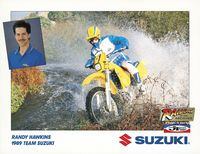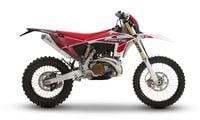Randy Hawkins won the AMA National Enduro Championship seven times between 1988 and 2004. This promotional photo shows him running that number one plate into the 1989 season, where he repeated his title win. It was his second, and the first for the all-new Suzuki RMX, which he helped develop through the end of the ‘88 season.
THE SEASON: "I won the championship in '88, it was my first title, and being a rookie, you almost win the championship before you realize it. But your second, your repeat championship, I don't care who you are, is always more difficult; there's more pressure and people expect it. Going into the '89 season I actually had quite a bit more pressure on myself, and there's just more pressure because you're the champion coming back versus your first time championship… On the other side of that, we tested the RMX. '89 was the first full season for the RMX. We actually rode them at the end of '88, so that had a lot of excitement to be involved with the first year of the RMX. Then also, too, to be able to win the RMX's first championship – I'd put some goals on myself not just to win an enduro title, but to do something for Suzuki and it was the first year for that bike… The season always started in California and when you'd go out there and race guys like Larry Roeseler and later in my career guys like Ty Davis, those guys were really tough. Once we moved back to the East, those guys seemed to struggle. For the season I was familiar with the races since I'd been doing them for the last 3 plus years. You get a few new races here and there but you still have a feeling of where you're at and what's going on. I was very comfortable at that time, with the timekeeping, which is no longer now, so that was one of my strong points. I had a lot of help then with any issues; our team manager was Charles Halcomb, my teammate was Dave Bertram, who owns Cycle Gear now, and Dave was kind of the older veteran to me so he really kept me grounded. He was a solid guy, always there, so he helped me tremendously on that side. And then my mechanic basically has been my mechanic my whole career and is basically one of my best friends Dale Stegall, and he helped me with anything I wanted to do from the racing side of it. Not just being a racer, having some really key guys in your camp is a must. '88, '89 and '90 were pretty much Cinderella years, I don't think I could do anything wrong. The '89 season I rode well, I rode hard, the bike was wonderful, I'd say my support group was great, Suzuki was fired up about it and they kept me fired up, so it was a really plumb time for me."
THE BIKE: The '88 Suzuki wsa a great motorcycle to start with. We didn't start seeing the RMX until probably the last quarter of the year. I'd already wrapped up the championship, so I rode the RMX at the last event in Louisiana. It was good, I didn't win the event, but we learned a lot because it was a prototype bike. We had actually done a lot of testing for the RMX, but unfortunately when you're here in the States, and I've heard it from other guys too, with the brands – we'd done a lot of testing that was really good, but I think when it goes back to Japan, I think those guys come back with their last say in stuff, like the suspension settings and some little stuff that we really worked hard on; the bike didn't actually come that way . But the bike came with that stuff another year or two later. It's almost like they took our information, and rather than bringing it all at one time, they kinda used it – because the RMX basically didn't change from '89 until they killed it off in '96, I think; you could still put the plastics from the '89 on the '96 model bike. That's something that was a little bit disappointing, because when you put so much effort into testing, when you see the finished product it wasn't what you felt was the best. But here again, they still built a great woods bike. The RMX, I think they could've, in my opinion, kept that bike alive and kept it updated it with the RM and had a few more really good years out of that model… The strong point was basically the turning, the handling of the bike. The suspension and how well the bike handled in turns, I don't think there was a bike better than the RMX out there. Kind of a two fold, on the weak side, the motor was kinda weak, but one way to look at it, with a motor that was kind of weak, you could ride the thing as hard – it was almost like you could ride the thing wide open from when the gate started until the end of the day because it just didn't wear you out. On the East coast when it was tight and technical I think that's where it really shined. When you got out to the West coast with the open areas, the bike wasn't that fast. I know we'd be out there racing out west and I'd be out there and later Ty was on a KX – I couldn't even get my RMX to wheelie in fourth gear and he's like going out of sight… The RMX was a slender bike, it was narrow, it turned great, it had good brakes, the suspension was good. Another thing that they did a really good job on, it doesn't sound like much, is the tank design. It was narrow, the center of gravity was low… My race bike was . It had Factory Connection suspension, Jeff Slaven did the motors for me to get some more motor for me. At that time Pro Circuit was doing pipes for us, other than that it was personal stuff, Pro Taper bar, grips – the only other thing we did to it, the footpegs were pretty narrow so we took another set of footpegs, this was before anybody had wide footpegs, we'd take another set, cut 'em in half, and weld that on the back side of the footpeg to widen it up. The bike was surprisingly stock, we didn't go crazy on it. We didn't have titanium all over it or one-off forks and factory suspension. The suspension was stock other than a revalving.
TODAY: "I with Yamaha now, I'm managing their off-road program. Basically anything that they do off-road-wise comes through AmPro Yamaha. That's my program here in South Carolina. We try to get the most out the bikes we can, make riders comfortable. What Paul Whibley likes on a bike is not what Jordon Ashburn likes versus someone else. My big role in that is - these guys know how to go fast, I just work hard putting the tools on the table to help those guys get to their maximum potential." Check out more at www.amproyamaha.com.

/cloudfront-us-east-1.images.arcpublishing.com/octane/MWPL3DSK4JE67HTP2SKEXNG5DU.jpg)
/cloudfront-us-east-1.images.arcpublishing.com/octane/APGX5T2I6ZFOPOG4QS43QFQZXY.jpg)
/cloudfront-us-east-1.images.arcpublishing.com/octane/6TYGJN2CA5EW5NCEPBMW2ZWT4A.jpg)
/cloudfront-us-east-1.images.arcpublishing.com/octane/QWHGNDR3CBEGJDRDMQO5FSIA3U.jpg)
/cloudfront-us-east-1.images.arcpublishing.com/octane/RZ6CADCPUBEJNEZNWR46CL4N5Y.jpg)
/cloudfront-us-east-1.images.arcpublishing.com/octane/KJ4O2O6GNVAGBMAWC2AQFB76TI.jpg)
/cloudfront-us-east-1.images.arcpublishing.com/octane/P3YSTQDTSFAVDB24J4OVXASWAQ.jpg)
/cloudfront-us-east-1.images.arcpublishing.com/octane/TPATI3SRXRF23BKAWGPWKG4XGY.jpg)
/cloudfront-us-east-1.images.arcpublishing.com/octane/YJCHYTTH25C7NPG5ITN4WVZHXQ.jpg)
/cloudfront-us-east-1.images.arcpublishing.com/octane/OVZFUJM32JBQRDX4FYGBNOGAYA.jpg)
/cloudfront-us-east-1.images.arcpublishing.com/octane/AL2QOKCWUJDSDDFNONE4FOONL4.jpg)
/cloudfront-us-east-1.images.arcpublishing.com/octane/33UTMDHIH5B45HVOLFJ6GD76QY.jpg)
/cloudfront-us-east-1.images.arcpublishing.com/octane/44W4OD5KDZFD3FQWWHZV63P4TY.jpg)
/cloudfront-us-east-1.images.arcpublishing.com/octane/SQ3CEIVCOJF7FDERDVDKKPIC7A.jpg)
/cloudfront-us-east-1.images.arcpublishing.com/octane/LLLQLRK2DBH4PN66MDNA3AFJNY.jpg)
/cloudfront-us-east-1.images.arcpublishing.com/octane/5DMU4K752FBWLLJD432GRAAH2A.jpg)
/cloudfront-us-east-1.images.arcpublishing.com/octane/TGHDVMIODJC4BNKJDZKKTSWXWI.jpg)
/cloudfront-us-east-1.images.arcpublishing.com/octane/5KYMT24REJEFPNO2J2M76MXERM.jpg)

/cloudfront-us-east-1.images.arcpublishing.com/octane/3GXGR3EKSNH5NI3CWHV5SJ7TXE.jpg)
/cloudfront-us-east-1.images.arcpublishing.com/octane/JEU3ONDWEFCAZNAZJOU24OJ2PM.jpg)
/cloudfront-us-east-1.images.arcpublishing.com/octane/JQ6LMK6LLBAQJIL2AH56UIUKWU.jpg)
/cloudfront-us-east-1.images.arcpublishing.com/octane/QUSF4LLRM5DDPCJW25RINQRJPE.jpg)
/cloudfront-us-east-1.images.arcpublishing.com/octane/FYDGK7GF4JBPXERA5RAZPY3YJI.jpg)